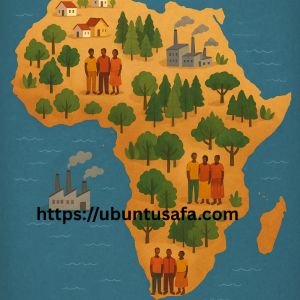Why do African leaders continue to sign unbalanced deals that benefit China more than their citizens?

Why African Leaders Continue to Sign Unbalanced Deals Favoring China Over Citizens-
Over the past two decades, China’s economic engagement in Africa has intensified, particularly through infrastructure financing, trade agreements, and resource extraction deals. While these arrangements often promise development and modernization, a critical pattern has emerged: many of these deals disproportionately benefit Chinese interests, leaving ordinary African citizens with limited gains. This raises pressing questions about governance, accountability, and the strategic decisions of African leaders.
The Appeal of Chinese Deals
1. Immediate Infrastructure and Development Gains
African leaders face immense pressure to deliver visible development quickly. Chinese financing packages are often appealing because they promise rapid construction of roads, railways, ports, and energy facilities. Unlike Western aid, which may involve strict conditions, Chinese loans and investments typically come with fewer political strings attached, making them politically attractive for leaders seeking tangible results.
2. Avoiding Conditionality
Western lenders and development partners often require governance reforms, transparency measures, and anti-corruption policies in exchange for loans. Chinese financing tends to be less intrusive in this regard, appealing to leaders who want autonomy in their internal affairs, even at the cost of long-term economic sustainability.
3. Political Expediency
Signing Chinese-backed projects allows leaders to demonstrate progress to their constituencies, particularly in regions where infrastructure deficits are severe. These visible projects can be leveraged for political gain, such as during election cycles, even if the long-term benefits to citizens are limited.
Structural and Governance Factors-
1. Weak Institutional Oversight
Many African countries have limited capacity to negotiate complex international contracts effectively. State institutions may lack the technical expertise to evaluate financial terms, debt sustainability, or the implications of concession agreements. This creates a situation where deals are signed that favor foreign investors over national interests.
2. Concentration of Power
In several countries, political power is highly centralized, with decisions over foreign investment concentrated in the executive branch. This reduces checks and balances, allowing leaders to approve deals without meaningful scrutiny or consultation with legislative bodies or civil society.
3. Limited Public Accountability
In environments where citizens have limited access to information and low capacity to hold leaders accountable, there is little immediate political cost for signing deals that favor foreign interests. Without transparent reporting and public debate, decision-making often remains opaque, increasing the likelihood of unbalanced agreements.
Economic and Strategic Incentives
1. Access to Capital
African economies often face chronic underinvestment in infrastructure and industry. Chinese loans provide much-needed capital, even if repayment terms are burdensome. Leaders may calculate that the short-term benefits of these investments outweigh potential long-term costs, particularly when alternative sources of funding are limited.
2. Strategic Partnerships
Aligning with China offers political and diplomatic advantages. China is a global power willing to invest without imposing governance reforms, creating an attractive alternative to Western partners who may impose conditions. This partnership can enhance a leader’s geopolitical leverage both domestically and internationally.
3. Patronage Networks
In some cases, unbalanced deals may serve elite interests, reinforcing patronage networks that sustain political power. Infrastructure projects funded by Chinese loans can be used to reward loyal allies, consolidate political support, or channel resources to politically connected businesses, further entrenching inequality.
The Debt Trap Debate
Critics argue that many Chinese deals place African countries in “debt traps,” creating long-term economic vulnerability. While some analysts contend that the debt-trap narrative is overstated, it is undeniable that high levels of indebtedness constrain policy flexibility and can compromise national sovereignty.
When governments must prioritize debt servicing over public investment, ordinary citizens bear the cost. This creates a situation in which leaders’ agreements with China may benefit national budgets in the short term but fail to empower citizens in the long term.
Case Studies-
1. Kenya: Standard Gauge Railway
The Mombasa–Nairobi Standard Gauge Railway, financed primarily by Chinese loans, exemplifies the trade-offs involved. While the project modernized transportation, critics argue that the repayment burden is immense, and the project has not yet delivered widespread local economic empowerment.
2. Zambia: Copper Sector Investment
In Zambia, Chinese companies dominate copper mining. While Chinese investment has maintained production levels, local communities report limited employment opportunities in skilled positions, with profits largely repatriated.
Toward More Balanced Engagement
1. Strengthening Institutional Capacity
African states need stronger institutions capable of negotiating equitable deals. This includes developing legal frameworks, financial expertise, and technical capacity to evaluate and monitor foreign investments.
2. Enhancing Transparency and Accountability
Civil society, media, and legislative oversight can help ensure that deals serve public interest. Transparent reporting and public consultation can pressure leaders to prioritize citizens’ welfare over short-term political gains.
3. Diversifying Investment Partners
Reducing overreliance on Chinese financing by engaging with a broader range of investors can give African leaders more leverage, enabling them to negotiate more balanced agreements.
African leaders continue to sign unbalanced deals favoring China due to a complex mix of political expediency, immediate developmental needs, weak institutional oversight, and elite incentives. While these agreements often deliver visible infrastructure, they frequently fail to translate into broad-based economic empowerment for citizens. Addressing this challenge requires institutional strengthening, transparency, diversified partnerships, and a renewed focus on inclusive development that aligns national growth with citizens’ welfare.
- Questions and Answers
- Opinion
- Motivational and Inspiring Story
- Technology
- Live and Let live
- Focus
- Geopolitics
- Military-Arms/Equipment
- Güvenlik
- Economy
- Beasts of Nations
- Machine Tools-The “Mother Industry”
- Art
- Causes
- Crafts
- Dance
- Drinks
- Film/Movie
- Fitness
- Food
- Oyunlar
- Gardening
- Health
- Home
- Literature
- Music
- Networking
- Other
- Party
- Religion
- Shopping
- Sports
- Theater
- Health and Wellness
- News
- Culture

